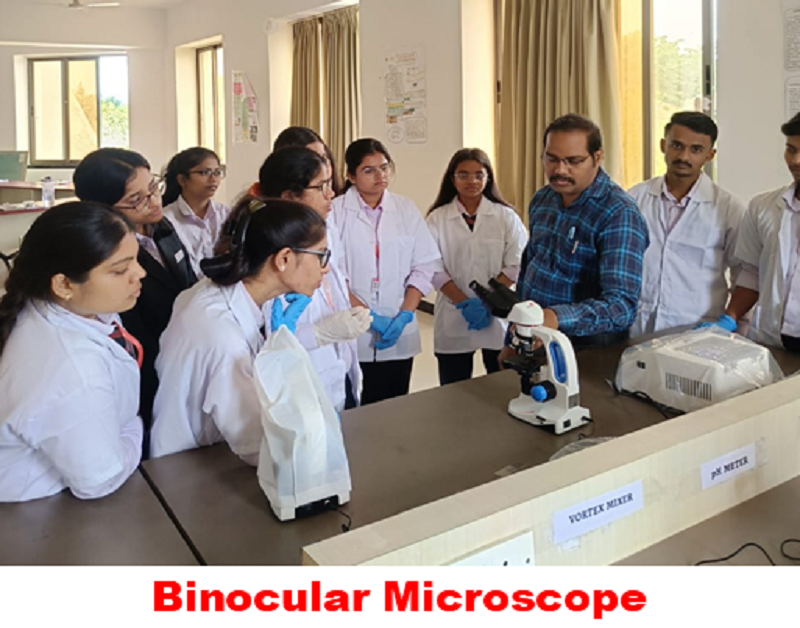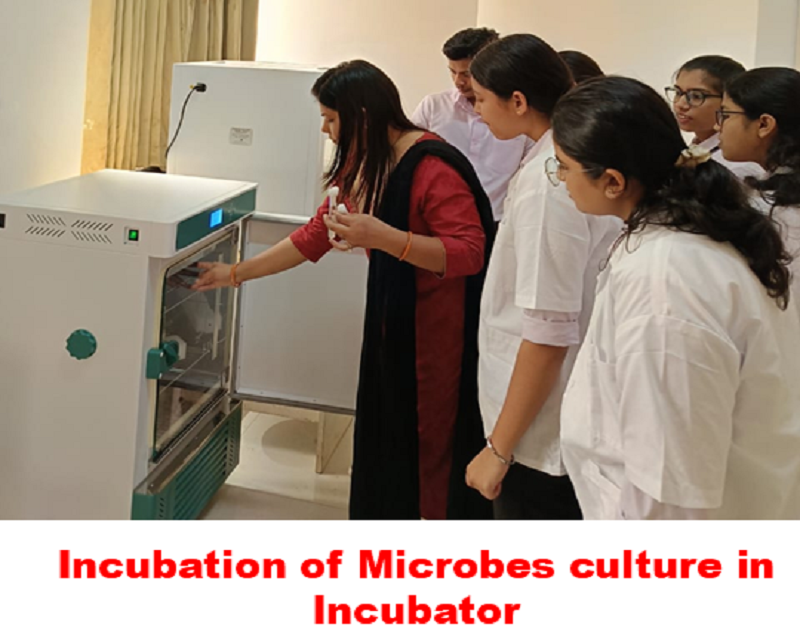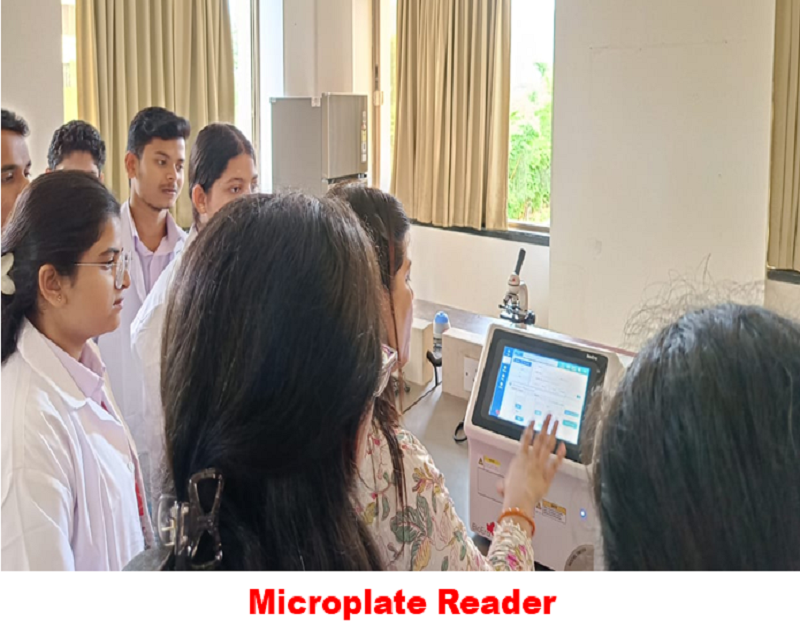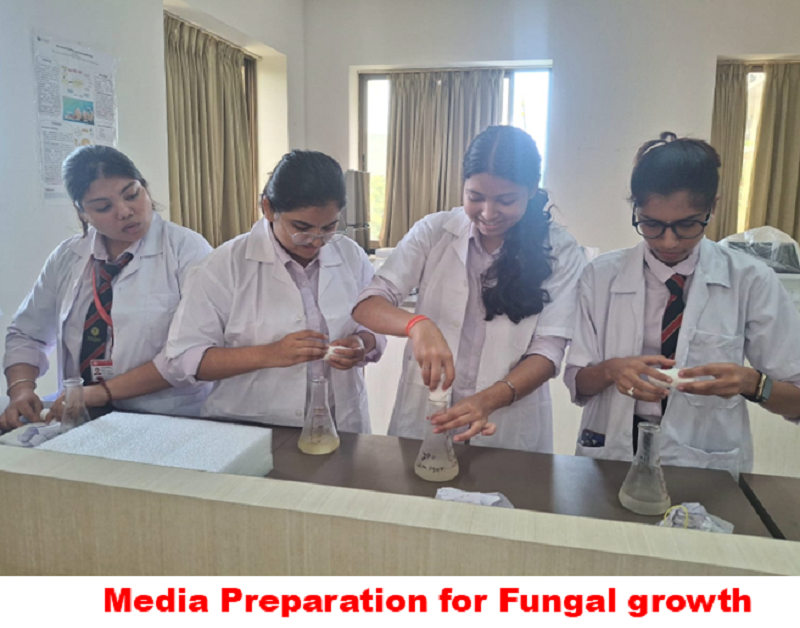Apply Now
About Biotechnology Engineering
Career Opportunities in Biotechnology Engineering

Clinical Researcher
Clinical researchers conduct drug trials within the purview of biotechnology and design trial methodologies, coordinate with trial investigators, and conduct relevant studies for setting up trial and research centres.

Pharmacist
Pharmacists are responsible for dispensing medical prescriptions, preventing the spread of harmful infections, counselling patients on medicine usage and dosage, and ensuring a well-stocked pharmacy at all times.

Lab Technician
Lab technicians are responsible for testing new products and technologies, develop and oversee lab tests, maintain standard procedures while conducting tests, maintain the lap as per set regulations, and ensure a clean and hygienic lab at all times.

Production Manager
Production managers in the field of biotechnology are tasked with overseeing the manufacturing process within a production unit, ensuring quality checks and controls, coordinating with workers, and enforcing safety standards within the production unit.
Fee Structure & Eligibility
| Programme | Sem | Year | Mode | Eligibility | Academic Fees Per Year (INR) |
Special Fees (Incl. Library Fee & Examination Fees) Per Year (INR) |
Fees Per Year |
|---|---|---|---|---|---|---|---|
| B.Tech Biotechnology | 8 | 4 | Sem | Passed 10+2 examination with Physics/Mathematics/Chemistry/Computer Science/Electronics/Information Technology/Biology/Informatics Practices/Biotechnology/Technical Vocational subject/Agriculture/Engineering Graphics/ Business Studies/Entrepreneurship as per table 8.4 Agriculture stream (for Agriculture Engineering) Obtained at least 45% aggregate marks (40% marks in case of candidates belonging to reserved category) in the above subjects taken together OR Passed minimum 3 years Diploma examination with at least 45% marks (40% marks in case of candidates belonging to reserved category) subject to vacancies in the First Year, in case the vacancies at lateral entry are exhausted. (The Universities will offer suitable bridge courses such as Mathematics, Physics, Engineering drawing, etc., for the students coming from diverse backgrounds to prepare Level playing field and desired learning outcomes of the program). |
Rs. 1,20,000/- | Rs. 10,000/- | Rs. 1,30,000/- |
Note:
- Admission Form and Prospectus Rs. 1000/- (One Time).
- Caution Money Rs. 1000/-
- Hostel Fees Rs. 1,10,000/- per annum + 5000 (Deposit Rs 5, 000 at the time of Admission only on refundable basis) Minimum 4 Occupancy
- Transportation Fees as applicable based on Route and Pick Up Point.
- Uniform Cost Rs. 6000/-
Achievements
Faculty Achievements
| Research Publication | ||
|
1. |
Varsha Rani, Maharajan Theivanayagam, Shefali Singh, Dinesh Chandra Joshi, Ramwant Gupta, & Dinesh Yadav* (2025). Elucidating the role of Pyrabactin-Like Receptors of finger millet under drought and salinity stress: An insight into in-silico, machine learning and molecular approaches. Frontiers in Genetics, 16, 1598523. https://doi.org/10.3389/fgene.2025.1598523 , Impact Factor: 2.8, SCI, QI |
|
|
2. |
Varsha Rani, Sumi Rana, Mehanathan Muthamilarasan, Dinesh Chandra Joshi, Ramwant Gupta, Rajesh Singh, & Dinesh Yadav* (2025). Identification and characterization of Eco-miR 169-EcNF-YA13 gene regulatory network reveal their role in conferring tolerance to dehydration and salinity stress in finger millet. Scientific Reports, 15, 12338. https://doi.org/10.1038/s41598-025-96233-x Impact Factor: 3.8, SCI, Q1 |
|
|
3. |
Varsha Rani, Vinay Kumar Singh, D.C. Joshi, Rajesh Singh, Dinesh Yadav (2024). Genome-Wide Identification of Nuclear Factor -Y (NF-Y) Transcription Factors Family in Finger Millet Reveals Structural and Functional Diversity. Heliyon (Cell Press). https://doi.org/10.1016/j.heliyon.2024.e36370 . IF: 3.4, SCI, QI |
|
|
4. |
M. Patial, Varsha Rani, D.C. Joshi (2024), Advancements in Medicinal Plants Genome Sequencing to Revolutionize Genomics. In: Nandave, M., Joshi, R., Upadhyay, J. (eds) Ethnopharmacology and OMICS Advances in Medicinal Plants Volume 2. Springer, Singapore. https://doi.org/10.1007/978-981-97-4292-9_15 |
|
|
5. |
KYadav, K., Varsha Rani., Anand, G., Yadava, U. and Yadav, D. (2025). Bioinformatic-driven Research in Microbial Enzymes: An Overview. In Microbial Enzymes (eds P. Chowdhary, D. Yadav, G. Anand and R.K. Gaur). https://doi.org/10.1002/9783527844340.ch35 |
|
|
6. |
Nazarul Hasan, Megha Budakoti, Rajendra Prasad Meena, Mahendar Singh Bhinda, Dinesh Chandra Joshi, Varsha Rani, C. Nandini (2025). Barnyard Millet: Crop for Climate Resilience and for Food and Nutritional Security.(pp. 67–91). https://doi.org/10.1007/978-981-95-1256-0_3 |
|
|
7. |
Rupali Gupta , Meirav Leibman-Markus, Gautam Anand , Noa Sela , Filip Zavadil Kokáš , Kateřina Perničková, Magdalena Bryksová, Lucie Plíhalová, Ondřej Plíhal, Maya Bar (2025). Cytokinin arabinosides show increased efficacy in priming tomato immunity and inhibiting the fungal phytopathogen B. cinerea. Plant Stress, 18, 101055. https://doi.org/https://doi.org/10.1016/j.stress.2025.101055 , IF: 6.9, SCI, QI |
|
|
8. |
Varsha Rani and Dinesh Yadav (2026). Deciphering biotic stress tolerance in small millet using multi-omics approach, Plant Gene, 45, 100577. https://doi.org/10.1016/j.plgene.2026.100577 . SCI, Q2, IF(1.6) |
|
|
9. |
Varsha Rani, Kanchan Yadav, Dinesh Chandra Joshi and Dinesh Yadav (2026). Harnessing Molecular Docking Approach for Nutraceutical Development from Plants: Current Knowledge and Emerging Paradigm. Springer. https://doi.org/10.1007/978-981-95-3823-2_13 |
|
|
10. |
Aiman Tanveer, Supriya Gupta, Shruti Dwivedi, Kanchan Yadav, Varsha Rani and Dinesh Yadav (2026), Microbial Enzymes Mediated Bioremediation of Wastewater: An Overview. Taylor and Francis. https://doi.org/10.1201/9781003527350-12 |
|
|
11. |
Varsha Rani, Ramwant Gupta, Manoj K Yadav, Rajesh Singh, Dinesh Yadav (2025) Regulation of Transcription Factors in Abscisic Acid-Mediated Signaling Under Abiotic Stresses. Taylor and Francis. https://doi.org/10.1201/9781003386315-15 |
|
| Conference Proceedings | ||
|
1. |
Varsha Rani and Dinesh Yadav (2025). Genomics and Bioinformatics in Millet Improvement: An Update, A Conference Proceedings published by Department of Genetics and Plant Breeding, Institute of Agricultural Sciences, Banaras Hindu University (BHU), Varanasi, U.P., India in collaboration of Uttar Pradesh Council of Agricultural Research (UPCAR)Lucknow, Uttar Pradesh, India, in National Conference on Innovative Approaches for Millets Improvement-IAMI@2025 November 7-8, 2025. ISBN No.: 978-81-997966-8-3 |
|
|
2. |
Rajeev Ranjan, Varsha Rani and Dinesh Yadav (2025) Genome wide assessment of transcription factors in millets under various abiotic and biotic stress. A Conference Proceedings published by Department of Genetics and Plant Breeding, Institute of Agricultural Sciences, Banaras Hindu University (BHU), Varanasi, U.P., India in collaboration of Uttar Pradesh Council of Agricultural Research (UPCAR)Lucknow, Uttar Pradesh, India, in National Conference on Innovative Approaches for Millets Improvement-IAMI@2025 November 7-8, 2025. ISBN No.: 978-81-997966-8-3 |
|
|
3. |
Varsha Rani and Dinesh Yadav (2025) Elucidating Potential role of WRKY gene family in conferring blast tolerance in finger millet. A conference Proceedings published by HABIT-2025, International Conference on Health and Agricultural Biotechnology: Interdisciplinary Trends (February 28 - March 02, 2025) Organized by Department of Biotechnology, Motilal Nehru National Institute of Technology Allahabad, Prayagraj-211004, India. ISBN: 978-81-963268-6-9 |
|
| Award | ||
|
1. |
Young Researcher Award to Dr. Varsha Rani in Three days International Conference on Health and Agricultural Biotechnology (HABIT 2025) organized by MNNIT Allahabad, 28th Feb to 2nd March 2025. |
|
|
2. |
Platinum Award to Dr. Varsha Rani for Best Publication in Q1 journal by DDU Gorakhpur University on 17th Feb 2025 |
|
Student Achievements
|
1. |
Khushi Pagar, Rohit Patil and Shashank secured 3rd rank in poster presentation Title “AI-based website for the detection of plant stress and its cure” in International Symposium on Herbal Technology and Green Bio nanotechnology for Innovation and Startup Opportunity (28th March -29th March 2025), organized by the Department of Biological Science, School of Science, Sandip University Nashik and sponsored by SERB. |
|
2. |
Bhagyashree Bhirud, secured 3rd rank in poster making competition in National Event KIZEN 2.0, 2024 (29th Nov 2024) organized by the Department of Biological Science, School of Science, Sandip University Nashik |
|
3. |
Ms. Anchal Hunge, secured 3rd rank in poster making competition in National Event Kiazen 3.0, 14th-15th Oct 2025 organized by the Department of Biological Science, School of Science, Sandip University Nashik |
|
4. |
Mr. Armish Peerzada, student of B.Tech Biotechnology 2nd Year, School of Engineering and Technology, Sandip University, Nashik, secured Silver + Elite Grade (Score: 75) in the SWAYAM–NPTEL Online Certification course on Dairy and Food Process and Products Technology, funded by the Ministry of Education (MoE), Govt. of India. |
|
5. |
Ms. Sanika Kolekar, student of B.Tech Biotechnology 2nd Year, School of Engineering and Technology, Sandip University, Nashik, secured Elite Grade (Score: 66) in the SWAYAM–NPTEL Online Certification course on Dairy and Food Process and Products Technology, funded by the Ministry of Education (MoE), Govt. of India. |
PEO, PO, PSO
Program Educational Objective (PEOs)
| PEO1 | Create an adequate human resource pool for employment opportunities in the critically important and dynamic biotechnology industry, R&Ds and consultancies within a socioeconomically sustainable framework. |
| PEO2 | Provide cutting-edge biotechnology research and teaching with a unique combination of theoretical and practical knowledge. |
| PEO3 | Provide trained people with strong knowledge and ethical standards to carry out and execute sponsored and collaborative research programmes and consultancies, which promote long-term collaboration between academia and industry and generate new resources. |
Programme Outcome (POs)
| PO1 | To inculcate a strong foundation in the basic fundamentals of engineering and sciences. |
| PO2 | Apply the knowledge of basic, emerging, and scientific advancements in the field of Biotechnology for problem solving fulfilling societal, environmental, and ethical functional constraints. |
| PO3 | Identify and define biotechnological problems, and offer potential solutions by conducting experiments, investigating, analyzing and interpreting data to arrive at substantial inferences and conclusions, with comprehensive oral and written expression of technical and scientific literature. |
| PO4 | Give reasoning and assess societal, industrial, health, and cultural issues with competency in professional biotechnological practices. |
| PO5 | Have awareness regarding environmental protection and biodiversity conservation and their responsibilities and duties towards it, both as a biotechnologist and as an individual. |
| PO6 | Apply the subject related technical knowledge for biotechnology related innovations and develop entrepreneurial outcomes for the benefit of mankind and human use and manifest the understanding of production and manufacture of different bio-related products and value-added product development. |
| PO7 | Demonstration of application of principles of biology/ biotechnology in inter/ multidisciplinary projects and attainment of the ability to translate the acquired knowledge and core competence among his/her professionals, clients and society. |
| PO8 | Understand the impact of the biotechnology research solution in societal and environmental contexts, demonstrate the knowledge of, and need for sustainable development. |
| PO9 | Utilize the principles of analytical thinking, clearly and critically, while solving problems and making decisions during development of biotechnology experimentation and research. |
| PO10 | Possess knowledge and comprehension of the core and basic knowledge associated with the profession of biotechnology, including Microbiology, Cell and Molecular Biology, Genetics, Biomaterials and Tissue Engineering, Biochemistry, Omics (Genomics, Transcriptomics, Proteomics and Metabolomics), Bioinformatics, Immunotechnology and Enzyme Technology. |
| PO11 | Demonstrate effective planning abilities including waste management, hospital management, Disaster management, delegation skills and research organizational skills. Develop and implement plans and organize work to meet deadlines. |
| PO12 | Embrace the need for lifelong learning in light of technological advancements in the broader sense and applicative transformations. |
Programme Specific Outcome (PSO)
| PSO1 | Acquire an in-depth understanding of fundamental concepts of Biotechnology and capability to apply the gained knowledge in their professional development and to fulfil the emerging industrial demands of the country. |
| PSO2 | Develop scientific aptitude and strong oral and written communication skills, specifically with respect to scientific and technical report writing. |
| PSO3 | Possess comprehensive knowledge of all facets of biotechnology and its multidisciplinary applications, with the ability to implement them for the betterment of humanity, while upholding strong ethical, cultural, and societal values, demonstrating distinctive leadership qualities, and embracing life-long learning. |

















